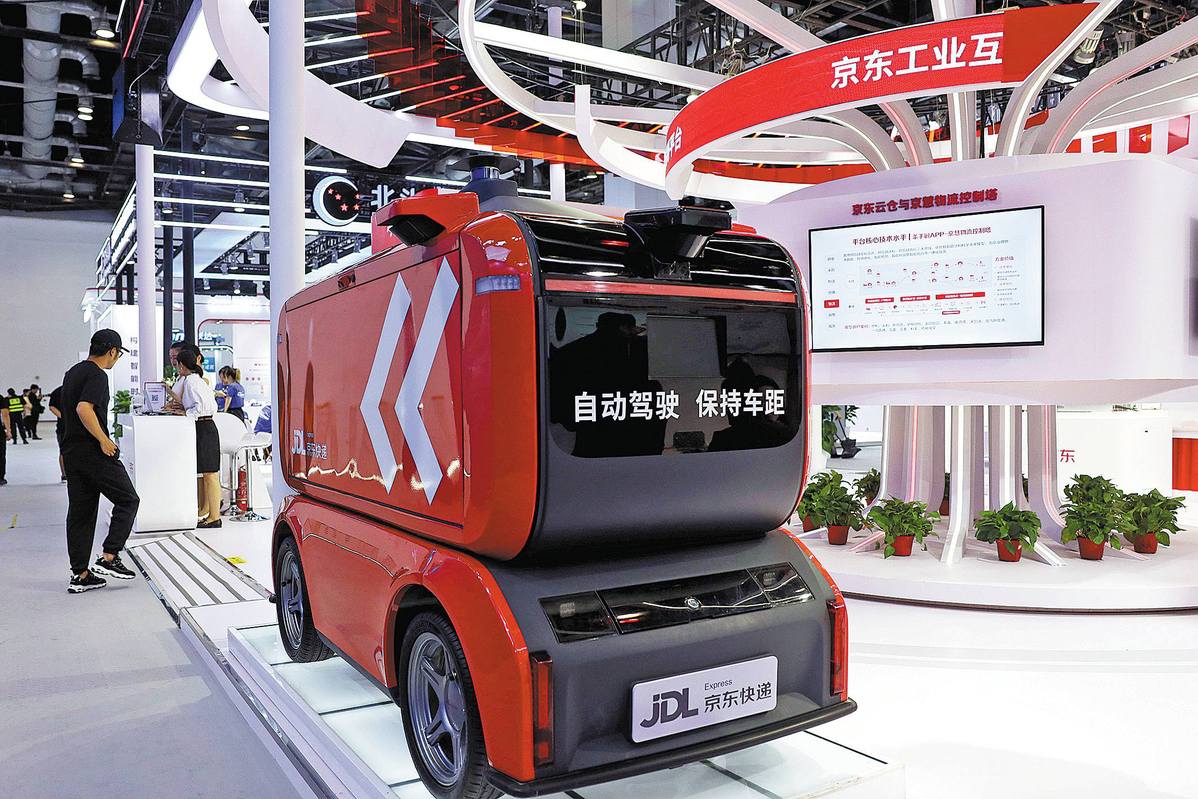Online platforms up ante with unmanned vehicles
By FAN FEIFEI | China Daily | Updated: 2023-09-19 09:40

Li Shuang, 33, an engineer at an internet company in Yizhuang, a southern suburb of Beijing, picked up her take-out order from an unmanned four-wheeled delivery vehicle that appeared at the gate of her community, avoiding any human interaction.
She received her order of fresh vegetables, fruit, seafood, meat and other groceries about 15 minutes from the time of placing it online through an app. After she paid for the order, she received a text message informing her that the delivery vehicle was about to arrive.
Like Li, hundreds of millions of Chinese consumers vouch for the efficiency and reliability of intelligent logistics technologies. Driverless delivery vehicles, robots and automated warehouse systems have been increasingly adopted to enhance logistics efficiency, reduce costs and improve user experience.
Compared with traditional delivery, unmanned delivery features lower delivery costs, larger carrying capacity and higher safety. It also provides a viable alternative to address some challenges, such as rising labor costs and a shortage of couriers, experts said.
Dada Group, one of China's largest on-demand delivery and retail platforms, is accelerating steps to expand its unmanned delivery network in collaboration with JD Logistics, the logistics arm of e-commerce giant JD, and White Rhino, an autonomous delivery vehicle developer.
The company said its autonomous delivery system has already been adopted by Seven Fresh, JD's supermarket chain, Yonghui Supermarket and Walmart's Sam's Club, as part of a broader drive to normalize the scalable use of unmanned delivery vehicles for on-demand service.
The system can distribute orders automatically for supermarkets, manage package loading and maintain the normal operations of orders through its human-machine interaction technology, as well as dispatch the unmanned vehicles and plan routes to ensure the latter efficiently fulfills online orders.
JD Logistics said smart technologies ranging from unmanned warehousing to intelligent sorting robots are employed in its highly automated warehouses to enhance logistics capacity.
The company operated nearly 1,600 warehouses and over 40 Asian No 1 intelligent logistics parks across the country by the end of June. JD's Asia No 1 intelligent logistics park in Kunshan, Jiangsu province, stands as the world's largest intelligent logistics park — capable of sorting 4.5 million parcels per day.
Its warehouses deeply integrate cutting-edge technologies, such as deep learning, big data, operations research, machine vision system recognition and digital twin modeling, enabling it to handle millions of stock-keeping units covering hundreds of categories.
Damo Academy, a research institute that Alibaba Group Holding Ltd launched in late 2017, has rolled out its Xiaomanlv unmanned delivery vehicles to address last-mile delivery challenges.
These vehicles have L4 self-driving capability and can automatically calculate optimal routes and avoid obstacles when delivering parcels. L4 autonomy means the car can drive itself in most conditions without a human backup driver. Alibaba received approval to test its Level 4 self-driving trucks last year in Deqing county, Zhejiang province.
In addition, JD has stepped up efforts to apply drones to logistics and delivery activities. The Beijing-based company used drones to deliver online purchases to rural shoppers in Jiangsu province in 2016, kicking off the e-commerce giant's use of unmanned aerial vehicles for distribution purposes.
Chinese food delivery platform Meituan has made major strides in drone usage. Its drone delivery services have landed in several commercial districts, scenic spots and residential communities in Shenzhen, Guangdong province, and Shanghai, completing nearly 170,000 orders.
Noting that the application of driverless delivery technologies could boost delivery efficiency and reduce costs, Lu Zhenwang, CEO of Wanqing Consultancy in Shanghai, said, "Chinese technology companies have invested heavily in the intelligent logistics sector on automated warehousing, driverless cars, drones and robots to gain an upper hand amid fierce competition."
Unmanned delivery services have been deployed in some designated areas and scenarios, such as hotels, supermarkets and universities, considering the limitations of the current autonomous driving technologies and complicated traffic situations, Lu said, adding that it will take a long time for unmanned delivery services to become commercialized on a large scale.
- CN Logistics: Luxury fashion logistics expert expands business through e-commerce
- 4th International 3E fair in Shanghai a success
- Over 80% of restaurants offer spicy dishes in China: report
- Freshman dons armor: Let the college battle begin!
- China's Netflix iQIYI flexes muscle with strongest Q2 performance
























